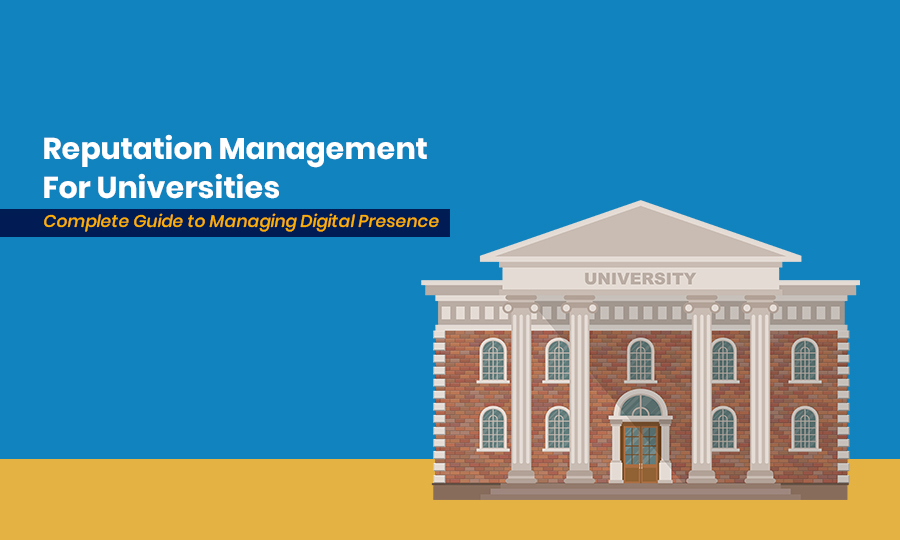In today’s highly competitive digital era, a university’s reputation no longer depends only on its campus culture or academic benefits. It is mainly shaped by what people see about it online. Nowadays, students don’t prefer to flip through brochures to know about universities; rather, they search online, scroll social media, check websites, and read online reviews. Your institution’s online reputation is what impacts its first impression! And that’s where online reputation management for universities comes into play.
A 2025 HigherEd Insights survey claims that more than 88% of students read online reviews before enrolling in a college. This statistic shows that the better reputation your university has built over the years, the higher its chances are of attracting more student enrollments.
Higher education is a huge investment for both the students and the parents. No matter what course students choose for themselves, their main priority has always been to get admission to a reputed university.
Suppose negative news stories, poor student reviews, or outdated information appear online when someone searches for your university’s name. In that case, your institution will never become a first-stop destination for students seeking higher education. To prevent this major reputational and financial damage, explore our comprehensive guide where you can learn how to build and manage a stellar reputation for your institution and ensure exceptional student enrollment.
What is Reputation Management for Universities?
It refers to a set of strategic tactics that requires university authorities to build, monitor, and safeguard their institution’s public image across online platforms. It’s about navigating what the online users, students, their parents, and other stakeholders perceive about a university. From managing online reviews and building positive content to establishing a strong online presence, university reputation management involves certain best practices to foster student trust and institutional credibility.
A positive and noteworthy reputation can help attract students, faculty, and funding to your university. With the increased popularity of online platforms like social media, search engines, local business directories, and review sites, maintaining a favorable digital presence has become extremely crucial.
What’s the aim? Online reputation management (ORM) aims to provide enough proof about a university’s reliability and credibility against negative online discussions that can damage its online reputation. Additionally, the process fosters positive sentiment regarding the university, its culture, policies, and other academic benefits. It even mitigates the severe impact of potentially damaging content. It shapes public perceptions and how students and their parents see their educational institute.
What else can it offer?
When university authorities prioritize implementing effective strategies to maintain a positive image, it gradually improves the institution’s digital visibility and attracts potential students and top-notch faculty. When you start monitoring your university’s online conversations, you can better navigate the digital landscape and protect the institution’s credibility.
Why Does Digital Reputation Matter for Universities?
Do you know that a single negative online review about your university’s campus culture or an unanswered query regarding your university’s newly launched academic policies can damage its reputation overnight?
Not only the reputation the university has built over the years, but also the student enrollments and your institution’s credibility. That’s why effective online reputation management for universities is crucial.
6 Major Benefits of Reputation Management for Universities
Your university’s digital reputation is the primary deciding factor for potential students and their parents whether they will choose your institution over your other competitors. Thus, online reputation management is a must-have marketing strategy for every higher education institution, including universities.
So, what’s the takeaway?
Your university’s reputation is not just what people say about it; rather, it’s what you’re doing to shape the online conversation. Here, we will talk about the major benefits of effective reputation management brings to a university.
- Increased Student Enrollment
A proactive reputation management approach helps universities make them more attractive options for potential students and their parents. Would you choose a university with a poor online reputation for your close one’s higher education? No, right? That’s how the majority of people look for educational institutions that appear positive online. With a good digital image, you can ensure higher student application rates and enrollment numbers.
- Better Faculty and Research Partnerships
So, it’s not only about attracting more students, but also about top faculty recruitment and research collaborations. When your university has a positive online reputation, expert academic professionals will see your institution as a favorable environment for professional advancement. You can effortlessly attract top-tier faculty and partner with authoritative organizations for research purposes.
- Improved Student and Parents’ Trust and Organization Credibility
Effective reputation management ensures that your university earns the trust of existing and prospective students and their parents as the ultimate hub for higher education. Similarly, it significantly enhances your institution’s overall brand credibility, which is one of the most important factors students and parents look for when choosing a higher education institution.
- Strong Alumni Relations and Donations
We suggest that university authorities must consider performing effective ORM best practices. Apart from attracting talented students and employing top-notch faculty, a university can maintain a strong connection with its alumni association by maintaining a positive online reputation.
Your alumni batch will be delighted to stay engaged with and financially contribute to your university if they’re proud of it. It will result in stronger relationships with the alumni and an increased number of donations.
- Authoritative Position in the Higher Education Industry
A strong reputation can help universities establish themselves as thought leader in the highly competitive higher education industry. Effective ORM establishes the university as one of the most reliable and credible higher education resources in the industry. You can thrive in today’s competitive higher education landscape as a key player and achieve long-term success.
- Placement Opportunities from Reputed Organizations
You must have heard of renowned global organizations running huge placement drives in some top educational institutes to seek top talent across the globe. Without a positive and strong reputation, your university may not get this opportunity.
A positive reputation of your university among employers significantly improves the perceived value of its graduates. It leads you offering better placement opportunities and great career outcomes for your students.
What Shapes a University’s Reputation in Today’s Digital Age?
A renowned online reputation monitoring agency that offers personalized services for universities often helps them manage online brand perception, build an attractive social media presence, and represent their expertise to the media for positive coverage. The ultimate aim is to build a stellar reputation for their clients.
But do you know that these are not the only factors that contribute to shaping the digital image of universities?
Yes, you’ve heard that right! From academic efforts and student satisfaction to graduate outcomes, these traditional factors highly influence a university’s online reputation. In this section, let’s have a clear idea of these factors shaping the online image of universities in this competitive digital scenario.
- Academic Efforts and Research Input
If you’re thinking that these are just foundational factors, let us tell you that the impacts of even all these are now amplified online. When your university features in the top when it comes to academic efforts and research inputs, you can create high-quality, positive content related to this expertise. Such content can make your university more visible for online mentions and even simple searches.
- Student Satisfaction
This is one of the most critical internal factors that can determine your university’s reputation. One of the primary aims of effective reputation management for universities is to ensure exceptional student satisfaction. If your university students are satisfied with the academic benefits and career opportunities your institution is offering, they’re more likely to leave positive online reviews. And this is directly associated with an improved reputation of your university.
- Campus Culture
Today’s students prefer to share their experiences online, specifically on social media platforms. According to a 2024 study by Sage Journals, 70% of college students use social media daily. You can imagine the prevalence!
So, even if a student faces any sort of negative on-campus experience, they will be more likely to share the incident on social media. And this can severely damage your university’s reputation. Thus, it’s important for university authorities to ensure a positive and friendly campus culture within their institution.
- Online Perception
How does the virtual world perceive your university as a higher education resource? The answer to this question plays a crucial role in building a strong online reputation for a university.
From your university’s digital footprint and website usability to the online reviews it receives and the search engine results that appear when someone searches for its name, the online perception of your university combines everything and beyond. How your university appears online heavily influences the decisions of students who don’t come from the institution’s location.
- Graduate Outcomes
Do you know that you can utilize the success of your alumni as a reputation-building treasure? It requires you to stay connected with your alumni through LinkedIn and other networking sites. When your potential students see that previous graduates from your university are flourishing in their careers, it increases their trust and confidence in your university’s expertise. It will increase the acquisition of your future students.
- Social Media Presence
A strategic and engaging social media presence is all that a university requires to build a robust online reputation. Whether it’s about digital marketing or online community building, a positive social media presence with a bunch of engaging posts is your ultimate savior.
The content you will share, the level of student engagement these posts will get, and the right utilization of different social media platforms like Instagram, Facebook, and TikTok, majorly determine how a university’s reputation will appear online..
- Media Representation
No matter how positive a university appears online, how it’s portrayed in the traditional media is also crucial. It has a powerful influence on the university’s digital reputation. When your university is getting enough media coverage, you can highlight your achievements and challenges. Positive media representation can shape public opinion about your institution beyond its own channels.
A Guidebook of Effective Online Reputation Management for Universities: 8 Core Strategies to Implement
Higher-education institutes like universities often require a robust reputation and a memorable online presence to acquire new students by gaining their trust and confidence. Here are some personalized ORM strategies that university authorities can implement to achieve the desired position in the virtual world and stay ahead of their industry competitors.
Strategy 1: Establish a Strong Online Presence

The first step is to build a strong online presence.
Do you know that more than 80% of potential students start their search for an educational institute online? The internet is the first stop destination for the majority of students and their parents while selecting the best place to study.
This is why you should no longer rely on the reputation that a flyer pinned to a community board in your university reflects. Your university’s reputation must show up where the students and their parents are looking on screen.
Imagine offering the best academic benefits in your university, and no one can find your institution online. Does it even matter?
The answer is a clear NO! Here are some online presence management strategies for your university.
- Develop A Digital Storefront: Your University Website
Website building is one of the major parts of online reputation management for universities.
A website is everything for your university – the handshake and greetings that you usually offer while pitching for your institution, all rolled into one single platform.
The better your university website looks and feels, the more chances students will stay on the website and explore. Through the website, your prospective students can even virtually experience everything about your university before stepping onto the campus in person.
- Identify your Target Audience
Consider your university website as a central hub for all your operations, not a brochure. Before starting with the right platform and host selection, you must outline your site’s goals (e.g., recruit new faculty, engage alumni, enroll more students, offer online courses, or sell merchandise) and identify the audience you’ve planned to target (e.g, potential students, their parents, current students, faculty, and community).
- Choose a Suitable Platform and Host
University authorities can select a suitable website builder or content management system (CMS) to develop their official site. The platform must offer scalability and robust security features like SSL certifications, built-in monitoring, and more.
- Register a Domain
University authorities should choose a professional yet easily memorable domain name for their official website. The domain name shouldn’t be something that people struggle to remember, as a difficult name may make it complex for them to find your university online. The domain name shouldn’t be similar to any other website, as it will create confusion. We suggest you obtain a .edu domain for your university site.
- Plan the Website Design
The design can be minimal yet offers all the essential details a student may look for in a university’s site. The design of your site must compellingly showcase all the important details. It should include high quality and on-brand visuals along with real photos and videos of your campus and students. Don’t forget to incorporate white space and uncluttered layouts to improve the readability of your website content.
- Create Website Content
The content you write for each webpage must offer clear information about your university programs, faculty, admissions process, and resources. From the Homepage to your Contact page, the content should reflect exactly what you want to convey through these pages..
- Manage Functionality
Your website design must be intuitive and mobile responsive. According to a Start.io study, people aged between 18-24 years are 53% more likely to use mobile phones. And your potential students are more likely to fall under this specific age group. If your university website doesn’t function seamlessly on mobile devices, you will lose a significant number of opportunities to acquire new students.
The website should load faster across all devices, no matter what the screen size is.
- Add Essential Pages
From the Homepage and the Course Catalog to the Student Portal and the Contact page, your university website must incorporate all the necessary pages. Let’s have a clear idea of the important pages you should incorporate into your university website.
| University Webpages | |
| Homepage | • A welcoming front door for your university, communicating everything you want to convey about your institute • Reflects your university values and mission • Leaves the first impression on the visitors |
| About Us Page | • Must include your university’s history, values, and strengths • Builds an emotional connection with the visitors through real stories • Shares the experience and expertise of your university faculty and staff (faculty bios) |
| Course Catalog | • An easily searchable section on your site that provides details about academic programs • Also offers information regarding research opportunities and online learning options |
| Admissions | • Incorporates clear information about steps to apply for admission, new faculty and staff requirements, and deadlines • Details related to financial aid to guide prospective students |
| Campus Life | • A section for sharing authentic photos and stories of your campus events and course facilities • Can be used to promote success stories and student testimonials |
| Contact Us Page | • Provides clear contact information like your university’s phone number, email ID, physical location, social media IDs, and contact form |
| News & Events/Blog | • Updates related to news, notices, and events • Keeps your website content fresh and engaging |
| Student/Alumni Portals | • A secure login area for existing students and alumni • Allows seamless access to specific resources |
- Maintain Consistent Branding across Online Platforms with Logos, Themes, Tone, and Visuals
The success of reputation management for universities is incomplete without a consistent branding. As a university authority, you must maintain a consistent branding across digital platforms. A cohesive visual identity can make your institution appear more professional, authoritative, and reliable.
Here’s how you can do it.
- Logo and Visuals: Choose a logo for your university related to education and related institutes. Ensure that your university logo can be immediately recognized by people. Your university logo should be consistent across your official website, social media pages, and other third-party directories. Inconsistent logos and branding can showcase your university as unprofessional and create confusion.
- Themes and Tone: The brand theme should be consistent across all online platforms. Choose a formal theme and color (for logo and the website) that is minimal yet attractive, relevant to educational institutes. As it’s about a university that is related to providing educational services, the tone should be formal and academic. The tone should be generally maintained in all your official social media communications as well.
- Showcase Your Achievements, including Research Breakthroughs, Alumni Success Stories, and Community Engagement
The majority of potential students and faculty are looking for proof of the quality and impact of the academic services your university offers. When you highlight your success stories and glowing student reviews, your potential students consume the content and gain trust in your university’s expertise.
Your student testimonials will serve as social proof and portray the value of your university.
Here’s what you can promote in this section.
- Research breakthroughs: You must add the research insights found by the research faculty and funding details for the research.
- Alumni Success Stories: You must post academic success stories of your alumni batch or recent graduates to build authority in the higher education industry. These features will reassure potential students about their career outcomes if they choose your university.
- Community Impact: Showcase your institute’s commitment to social responsibility and regional development.
Strategy 2: Manage Your Online Conversations

The online conversations your university will have with its audience, the students, their parents, and the faculty, play a crucial role in online reputation management for universities. There are some major social listening tools that you can employ to monitor or handle online conversations.
Let’s have a quick look.
- Employ Social Listening Tools to Track Online Brand Mentions
Your university’s online brand mentions and the response you give to the online comments and reviews you receive are considered the online conversations.
You can use social listening tools to monitor online mentions of the name of your university, programs, faculty, and other relevant keywords. The following three tools can help you track the mentions across various digital platforms. Choose what suits your requirement the best.
| Tools | Features to Use |
| Talkwalker | • Offers a comprehensive suite to monitor and report online conversations • Tracks your university’s brand health and ORM campaign performance • Helps in identifying emerging reputational crises |
| Brand24 | • Notifies you with real-time alerts and analytics on what the social media users are talking about your university • Allows for immediate response to the mentions on social media, news sites, and blogs |
| Mention | • Ideal for tracking online brand mentions of your university • Best known for real-time alerts and a user-friendly interface • Tracks keywords across over a billion sources |
b.Track the University-related Hashtags and Online Discussions
Now it’s about the hashtags related to your university on social media platforms and online discussion forums. You can get valuable insights related to student sentiment, popular topics, and related areas. When you search for those related hashtags, you can get a clear idea of how the online users are perceiving your university.
It will also help you identify the purposes for which your university name is getting mentioned. You can track the hashtags like –
- Official university hashtags like #UniversityName2025
- Program-specific hashtags like # GraduateProgramsofXYZ (imagine your university name is XYZ
- Location-specific hashtags like #XYZin[your university location]
- Event-related hashtags like #XYZEvents
- Department-related hashtags like #XYZDeptof[specific department names]
Apart from these hashtags, you can track the online conversations and discussions in forums like Reddit, Quora, and other specific student forums.
- Address Misleading Online Information and Negative Online Sentiment
While these online conversations can be fruitful for your university’s reputation, negative sentiment and misleading online information can also exist. Addressing the outdated and misleading information can help you prevent building negative public sentiment about your university across digital platforms.
- Rapid Response: Check online platforms to track the information available online about your university, its contact details, programs, courses, and more. It’s all about quickly identifying and addressing inaccuracies present in those details before they spread widely and create confusion. Consider hiring professional online content removal services to ensure the removal of harmful, outdated, and negative content about your university.
- Empathetic Engagement: If there is any negative sentiment about your university across the digital world, your first and foremost responsibility is to effectively respond. Additionally, you must provide a suitable resolution if there is any issue faced by a student, faculty, or staff member. This is the best possible way to turn a potentially negative situation into a positive audience engagement opportunity.
- Clear Communication: You must ensure clear communication with your audience. Providing factual and official information during communication with your students and their parents is the ideal practice to correct misinformation, if any.
Strategy 3: Develop Positive Content to Build Authority

Content is King!
You must have heard about this. Content can provide a full suite of benefits if you create it with personalization and distribute it strategically. Positive content can establish your university in an authoritative position. Let’s know how you strategize your content creation and distribution.
- Publish Informative Blogs, Create Engaging Videos, and Attractive Infographics
From informative blogs about your annual events to engaging videos about your campus culture, content can create magic when it comes to your university’s reputation management.
- Build your university authority – You can create high-quality content like blogs, videos, and infographics for your website, social media platforms, and online forums. Such positive content can position your institute as a thought leader in the higher education industry and a credible source of information. This can showcase your faculty research, your institutional values, and academic programs, and demonstrate your university’s expertise.
Here are some content ideas for universities.
- Blogs and articles
- Webinars, live Q&A sessions, and panel discussions
- Academic networking events and infographics
- Graduate outcomes and student statistics
- Glossaries
- Content related to financial aid and scholarships
- Virtual campus tours and campus life videos
- Community spotlights
- Rankings and awards
- Academic spotlights
- Student testimonials and success stories
- User-generated content and alumni features
- Studnet-centric campaigns
- Engage with a wider audience – There is a mix of media formats like blogs, videos, photos, and infographics that cater to diverse audience requirements. When you create content for your university, your primary aim must be to make complex data more accessible and easily understandable. Another way to improve your content engagement rates and reach, you simplify data and make it highly shareable, so that a wider audience can access it and get to know more about your university.
- Remain memorable with your content – Always remember that if your content is not something that your target audience will remember for a long time, it may not create the impact that you deserve. Choose visual content for promotional purposes as it’s more easily processed and remembered than normal text content. Furthermore, visual content can leave a lasting impression on content consumers.
- Feature Your Student and Faculty Stories to Humanize Your University
Real-life experiences can allow you to connect with your target audience. People love to consume realistic stories – how your students and the faculty have succeeded in their careers studying in your university.
- Humanize your brands by sharing real-life experiences and personal anecdotes on your website and social media profiles. It will help you make your brand more relatable and authentic to the audience.
- Authentic narratives regarding your students and faculty, along with the overall journey of your university, can create a real impact.
- In the competitive higher education landscape, you share unique personal stories to help your university stand out and communicate its distinct identity.
- Use Storytelling Techniques to Create Emotional Connections with Audiences
University authorities must use unique storytelling techniques to build strong emotional connections with their target audience. Storytelling taps into human emotions – a powerful method to establish a strong, long-term audience connection.
We suggest you share compelling stories about how your students overcome challenges, achieve success, and their personal transformation through a dedicated page on your website. When your existing students feel emotionally connected to your university’s narratives, they’re more likely to become your brand advocates, sharing their positive experiences about their student life in your university.
And, what’s best more than word-of-mouth marketing!
Strategy 4: Proactively Manage Online Student Reviews

Now, the next step is to effectively manage the online reviews received from your students.
You can generate, manage, and promote your reviews to make the best out of your online reputation management for universities. Here are some effective ways to manage your student reviews.
- Encourage Your Students and Alumni to Leave Reviews
Universities provide direct links to your university’s review profiles, such as Google Business Profile, niche, and Unipage. In newsletters, email footers, and relevant pages of your website, you can add those links to grab the attention of the recipients.
- Request reviews from the current students after a positive experience, including a graduation, completion of their successful semester, and recognition for academic excellence in an event.
- While requesting reviews from your students, you must emphasize that the review they will leave must be honest and voluntary.
- We suggest that you not offer money or direct incentives for getting the reviews from your students. The reviews will lose their authenticity. It can also violate the platform policies and damage your university’s credibility.
- Respond to Each Review on Time – Positive, Negative, and Fake
How you respond to reviews plays a crucial role. No matter whether the review is positive, negative, or fake, the university authorities must respond to each review within 24-48 hours. A timely response shows how you genuinely value your students’ opinions and feedback.
- For positive reviews – Aim to showcase your gratitude towards the positive feedback and personalize your response, addressing the students by their name. Acknowledge the reviews and mention specific details about their experience, what they have said.
- For negative reviews – Offer a sincere apology for the inconvenience the students have experienced. A little ‘sorry’ can go a long way! Address concerns mentioned in the review and try to offer a suitable resolution. Discuss the matter privately if the situation is complex and can be escalated during an online conversation.
- For fake reviews – Try to detect the patterns like irrelevant content, no profile details, poor vocabulary or grammar, poor word choice, and other specific details. For spam and fake reviews, you can report these reviews by following the respective platform’s guidelines. However, we recommend that you not engage in an argument in the public forum, no matter what the reason is.
- Turn Negative Feedback into Business Opportunities
Sometimes, handling negative reviews can seem like a daunting task. But with the right strategies for dealing with negative reviews can simplify the process.
You can regularly analyze the negative reviews to detect the ongoing issues highlighted by your students or their parents. Identify the most common trends in negative reviews, like a lack of specific course availability, parking problems, and slow administrative response time.
Use the negative insights received through the negative reviews to improve your services and the university’s operations. When the issue gets resolved, you must publicly announce the changes in your services. Don’t forget to inform the reviewers about the improvements.
- Integrate Reviews into Marketing Strategies
Received glowing reviews from your satisfied students?
Now it’s time to promote those reviews on your website and social media profiles. Do you know that people are more likely to read an average of 7 reviews before trusting a business? Likewise, your potential students will also rely on reviews before getting enrolled in your university.
On your promotional material, like the brochures, website, social media profiles, and flyers, you can showcase the testimonials. Trust us, this works like authentic social proof. Create a dedicated page ‘’what our students say’’ on your university website for showcasing your positive student reviews.
Strategy 5: Build Strong Relationships with Media

Without building a strong relationship with media and influencers, universities cannot achieve their desired online image. The following are some easy ways universities can establish strong relationships with popular media personalities and influencers.
Develop Relationships with Journalists and Education Bloggers
- Research about the top education journalists who cover related news stories.
- Apart from this, you can also partner with bloggers who write blogs about education and related organizations whose content aligns with your university’s mission.
- Tailor your emails and other forms of communication to explain your story.
- As a university authority, you must be a reliable educational resource in the industry.
- Respect the media deadlines to maintain a positive working relationship.
Train a Spokesperson to Handle Interviews and Media Inquiries
- Consider appointing a well-trained spokesperson to clearly convey your brand messaging.
- Such a trained expert ensures your university’s story reaches the right audience across the globe.
- The spokesperson will also handle difficult media queries, stay on message, and present informative details effectively.
- Ensure that the person is actively present during a crisis and deals with media interactions.
Publish Press Releases about Achievements, Awards, and Rankings
- Want to announce something big about your institute? Prioritize press releases to announce your university’s awards, ranking, and other achievements.
- Focus on promoting the breakthroughs and improvements through the press releases.
- Structure the press release with a compelling headline, an informative lead paragraph, quotes, and news.
- We suggest you distribute the press release through your official website, direct email, and wire services.
Strategy 6: Create a Crisis Management Plan
You may think that a crisis communication and management plan is not for universities, especially not a crucial part of reputation management for universities.
But you’re highly mistaken! Even university authorities must plan how they will act during a reputational crisis. Here’s how universities can implement online reputation crisis management strategies.
Plan 1: Create a Clear Framework – Response Team, Procedures, and Timelines
- A team to build – Universities must build a core team with designated roles and responsibilities. Don’t forget to hire a professional spokesperson to communicate with the public during a crisis.
- Assess the risks – Identify the potential reputational crisis for your university, including security threats, accidents, and natural calamities, and more.
- Define your communication goals – Define what you want to achieve with the plan, how you want to protect the campus community, and how you want to provide accurate information.
- Choose communication channels – Choose which online channels you’ll use to share information. Choose a platform where your target audience will be most active.
- Monitor and response protocols – Build protocols for how you can monitor information and how you’ll activate the plan whenever a reputational crisis occurs.
Plan 2: Respond Professionally and Promptly during a Crisis
It’s important to be professional yet empathetic when your university is experiencing an online reputational crisis. From following a pre-defined criteria to releasing the pre-approved holding statements immediately to acknowledge the crisis, every step matters during a crisis.
While sharing public statements, be cautious and communicate transparently. Ensure consistent communication with the university community and the public. You can also use multiple channels to reach stakeholders, including students, staff, and faculty.
Plan 3: Learn from Past Mistakes and Improve Your Future Actions
Mistakes happen, and it’s quite normal!
But what matters is what you’ve learned from your mistakes and what steps or actions you’ll take to improve services. Identify the strengths and weaknesses – what has worked for your university and what has not. Try to improve your crisis communication plan based on the insights you have received through this analysis.
Strategy 7: Turn Your Students, Staff, and Alumni into Brand Ambassadors

Now it’s time to turn your stakeholders into your brand advocates. You don’t need to promote your university and its programs; the stakeholders who have a positive experience in your university.
- Encourage and Promote User-generated Content – Encourage your students, staff, and alumni to promote and share user-generated content across popular institutional platforms. You can use guidelines on how they can contribute to your university community through sharing personal stories and experiences.
- Involve Alumni in Membership Programs – Involve your alumni in exclusive membership programs by providing tiered benefits like access to special events and opportunities.
- Appreciate Staff and Faculty Contributions Publicly – Publicly appreciating the valuable contributions of your staff and faculty is the best way to recognize their loyalty towards you. You can prioritize social media spotlights to acknowledge their hard work.
Strategy 8: Measure and Monitor Your University’s Digital Reputation

The last step is to measure and monitor your university’s online image.
- Track Key Performance Indicators
Here are some key performance indicators that you can track to monitor your university’s reputation.
- Sentiment Score – Online conversation across social media, news sites, and forums to understand how your university is being perceived by the online users
- Social Media Engagement Rate – Facebook insights, LinkedIn analytics to automatically calculate engagement rates
- Media Mentions – How many times is your university name mentioned across the web, print, and broadcast media
- Review Ratings – Online reviews (specifically Google reviews) and ratings you’ve received from your students, faculty, and other stakeholders
- Enrollment Rates – The number of students enrolled in the recent times to your university
- Positive Press Coverage – How the media is mentioning and explaining your university in their publications
- Growth in Alumni Participation – How many alumni have participated in your campaigns, community events, and other programs/or shared their feedback
- Use Helpful Tools to Simplify Reputation Monitoring
The following are four helpful tools you can employ to simplify the process of online reputation management and monitoring.
| Tools | Features to Use |
| Google Alerts | • Offer real-time notifications for new reviews and brand mentions • A free tool from Google • Provides email notifications whenever you receive new results |
| Sprout Social | • Comprehensive social media platform • Offers social listening features • Monitor conversations across social channels |
| Meltwater | • Tracks mentions across various social media platforms, blogs, and news • Useful for monitoring your university’s brand reputation • Best social media marketing tool |
| BrandWatch | • Ideal consumer intelligence and social listening platform • Offers in-depth analysis of online conversations • Helps in understanding the public perception of your university |
6 Common Mistakes Most Universities Make in Reputation Management
Universities commonly face certain challenges while building and maintaining a positive online presence. Making these mistakes time and again can ruin your ORM efforts. Thus, identifying these mistakes is crucial.
Here are the six most common ORM mistakes universities make.
- Avoiding Online Criticism
Many university authorities ignore responding to negative student feedback and criticism on review sites, social media platforms, and other online forums. If the online criticism involves any critical issues and they remain unaddressed, it can allow those issues to escalate (even if those issues are false) and showcase your lack of accountability.
- Not Prioritizing Media Relations
Many universities don’t prioritize building strong media relationships. They fail to get in touch with top journalists and news outlets to pitch for media coverage of their universities. This often results in missed opportunities to share positive stories about the universities and influence the public narrative about the same.
- Deleting Negative Comments
Do you have the habit of deleting every negative comment you receive on social media? If yes, then it’s a wrong practice. You must respond to the negative social media comments rather than deleting them.
Deleting comments will show that you’re trying to hide major issues or mistakes. Imagine if anyone takes a screenshot of the deleted comment and shares it widely? Regular deletion of negative comments from your university’s official social media channels can worsen the situation and even be seen as censorship.
- Overpromising in Marketing Campaigns
Have you exaggerated offering exceptional study programs, facilities, campus life, and academic benefits just to reach prospective students? If yes, this is quite common for university authorities. After visiting your university, if the potential students or their parents find that reality is far from your promises, it creates a sense of dissatisfaction and unfavorable word-of-mouth recommendations.
- Lack of Internal Communication among Departments
If the members in various university departments have frequent disagreements or other communication issues, it can prevent consistent messaging. Those departments will often face issues in coordinating their responses to those matters. This happens mostly because one member in the department is more likely to be unaware of what the other member is doing. Trust us, the situation is quite damaging during a reputation crisis.
- Treating Reputation as a Regular PR Activity
Are you someone who perceives online reputation management as just a PR best practice? If yes, you’re highly mistaken. A PR practice often focuses on outward appearances rather than being an institution-wide priority. Managing public relations is just a part of ORM, not the entire process. Apart from PR, ORM requires university authorities to manage their reviews, online presence, and deal with crises, and what’s not.
The Future of Online Reputation Management for Universities
As time passes by, educational institutions like colleges and universities are turning to online promotion of their academic plans and other educational service offerings. In recent years, technological advancements have been the most talked-about thing. Even higher-education organizations like universities are trying their best to adapt to the new-age students’ preferences for choosing a university.
They’re taking everything online from their enrollment process to building a positive reputation across the digital world. Let’s identify some major factors regarding the future of ORM for universities.
- Significance of Authentic Storytelling
It’s a huge part of the university’s reputation management. It is cutting through the noise of traditional marketing even the educational organizations are now tirelessly putting constant efforts to build a genuine emotional connection with their prospective students and parents.
- Universities are now sharing real stories about student challenges and achievements to make the institution feel more relatable and less like just an organizational entity.
- University authorities are now building trust, creating unfiltered narratives, and promoting testimonials rather than utilizing polished marketing.
- Growing Role of Student and Faculty Voices
Student and faculty voices are quite powerful in determining the reputation of a university. The voice, whether it’s positive or negative, plays a crucial role as a credible asset in university reputation management. Universities now employ user-generated content, like student reviews, to establish an authoritative position in the competitive higher education industry.
- Nowadays, more potential patients trust their fellow students’ experiences studying in a university.
- Universities now encourage students from various backgrounds to share their unique experiences.
- University authorities are now using platforms for open discussions and student takeovers of social media accounts.
- Rise of AI-based Reputation Tracking
AI has completely taken over how universities used to manage their internal and external operations. Artificial intelligence has introduced so many generative engine optimization tools that have made the process of tracking a university’s reputation much easier. Such AI-driven tools save valuable time and offer actionable insights that human teams alone often struggle to achieve.
- AI tools help in analyzing an enormous amount of user-generated content across social media platforms, online forums, and review sites.
- Universities can track brand sentiment, identify new trending themes, and detect potential reputational risks in real-time.
- AI-based tools often automate review and comment responses, saving valuable time and effort.
- Virtual Campuses and Hybrid Learning to Influence Brand Reputation
The shift has happened in reality in recent years! The shift towards online education and hybrid learning environments has received immense popularity among students. Those universities that adapt to these types of new learning techniques are creating new touchpoints for online reputation management for universities.
- Virtual platforms offer exceptional quality and reliability, unlike human-optimized operations.
- Such platforms offer the effectiveness of online instruction and a sense of community in digital spaces.
- The quality of digital experiences and e-learning opportunities significantly influences a university’s reputation.
When to Hire a Reputation Management Agency?
Is there a specific time to hire a reputation management agency?
No, there is not. But there are certain situations you can consider as signs that your university is dealing with some reputational crises, and you may need professional assistance to prevent their negative impact.
During such situations, when you seek professional help from an agency, it develops personalized strategies for your university and works on rebuilding its digital reputation. Whether it’s damaging online content or a PR crisis, the right ORM team comes to your rescue.
However, it’s not mandatory to seek professional help only when a crisis occurs. Universities that are new in the market and want to build a strong digital image can also hire expert agencies.
Let’s check out when you should hire a professional reputation management agency.
- Negative or outdated information spreading online – If an old, controversial social media post or negative, outdated information regarding your university goes viral across online platforms
- Persistent negative content – When negative student reviews, news articles, or social media posts are damaging your university’s online reputation
- Bad reputation over a significant period – If your university is dealing with a bad online image over a significant period, and you have witnessed no improvements in your reputation even after implementing several strategies
- A new brand building – Have you started your university from scratch? If yes, then you need to build a brand online and establish a strong and memorable university’s presence online – and for this, you may need the expert guidance of an agency.
- Improving existing online presence – If your university already has an underdeveloped online footprint and you want to strategically improve the institution’s online visibility
- Lack of an expert team or internal expertise – When you don’t have a skilled in-house team or your team doesn’t have the required expertise in effective reputation management and crisis communication
Note: If you lack the time, knowledge, and even an in-house team to manage your university’s reputation, hiring a reputable reputation management agency can be the turning point for your institution’s reputation.
FAQs
Ans. If you’re facing a negative viral controversy on social media, it’s best to communicate with your audience publicly. Influencers must take immediate, honest, and strategic action, specifically to take responsibility and communicate transparently. When you take strong actions to mitigate the impact of the controversy, it shows that you value your audience’s opinion about yourself and you’re ready to take any essential actions to resolve the issue as soon as possible. However, we suggest that you find out the root cause of such a controversy. It will help you proactively work to rebuild your audience’s trust and re-establish a positive reputation over time.
Ans. Yes, small and mid-sized universities can compete with elite educational institutions regarding online reputation. They can improve undergraduate teaching quality, program-specific training, student support, and other significant factors. However, it’s quite difficult to say that a small or mid-sized university can actually achieve the same level of digital reputation and global recognition as an elite educational organization. Such big universities or elite institutions often receive extraordinary prestige due to their massive research output, extensive resources, and historical endowments.
Ans. Yes, if you have a good budget to invest in your university’s ORM strategies, you must consider hiring a renowned reputation management agency. Based on your budget, project timeline, and specific needs, reliable ORM agencies often provide tailored services for higher education institutes like universities. They identify your unique reputational needs, develop a plan of action to meet your ORM goals, and deal with your current reputation challenges. If you already have an in-house online reputation management team that has proper knowledge and expertise, you may not need to hire professional services. But if you don’t, then it’s best to seek expert guidance to manage your university’s reputation.
Ans. A declining reputation often shows certain signs, like a sudden decrease in student enrollment, a wave of negative student reviews, social media memes or negative comments, an increased number of faculty resignations, and more. As a university authority, you can monitor enrollment numbers, monthly financial reports, accreditation status, institute rankings, student and faculty satisfaction, and more. If you notice any changes in these figures and factors, it may be a sign of your university’s declining reputation.
Ans. We cannot mention a specific timeframe for this. Online reputation management is an ongoing process that requires you to put constant effort. Universities must continuously monitor the public perception and their online presence across social media, media outlets, and search engine results. Regular monitoring can help you identify your university’s emerging reputational risks that might require an immediate increase in reputation audit frequency.
Conclusion
Managing online reputation is not a one-time task that will keep delivering you the desired results over time. Online reputation management for universities requires consistent efforts and a proactive strategic approach that the authorities can integrate into their institution’s marketing strategies.
Nowadays, all digital platforms are at everyone’s fingertips, which increases the importance of taking charge of the online narrative about your university. If you don’t prioritize it, you can lose meaningful new student enrollment, expert faculty hiring, and funding opportunities. We hope that our comprehensive ORM guide will help you shape public perception, attract top talent, and stay ahead in the competitive higher education industry.
Still have a doubt? Consider hiring a reputable online reputation management agency to seek their professional services tailored for universities.

